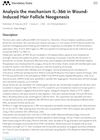 66 citations,
March 2018 in “British journal of dermatology/British journal of dermatology, Supplement”
66 citations,
March 2018 in “British journal of dermatology/British journal of dermatology, Supplement” An imbalance between certain immune cells is linked to a chronic skin condition and may be influenced by obesity, smoking, and autoimmune issues.
 3 citations,
April 2019 in “The journal of investigative dermatology/Journal of investigative dermatology”
3 citations,
April 2019 in “The journal of investigative dermatology/Journal of investigative dermatology” ILC1 cells contribute to hair loss in alopecia areata.
 2 citations,
April 2024 in “Advanced Materials”
2 citations,
April 2024 in “Advanced Materials” A microneedle patch can help regrow hair by restoring immune balance in hair follicles.
20 citations,
November 2017 in “JAAD case reports” Ustekinumab significantly improved psoriasis, vitiligo, and alopecia areata in a patient.
 April 2024 in “Bioscience trends”
April 2024 in “Bioscience trends” Higher levels of certain DNAs in blood may indicate hair follicle damage in alopecia areata patients.
 October 2022 in “Portuguese journal of dermatology and venereology”
October 2022 in “Portuguese journal of dermatology and venereology” Dupilumab led to complete hair regrowth and improved skin condition in a young man with severe eczema and hair loss.
47 citations,
August 2016 in “American Journal Of Pathology” Fibroblast changes in systemic sclerosis may help understand disease severity and treatment.
 6 citations,
January 2020 in “International journal of biological sciences”
6 citations,
January 2020 in “International journal of biological sciences” Removing the ROBO4 gene in mice reduces skin inflammation and hair loss by affecting certain inflammation pathways and gene expression.
 1 citations,
June 2022 in “The Egyptian Journal of Hospital Medicine”
1 citations,
June 2022 in “The Egyptian Journal of Hospital Medicine” Understanding the genetics of alopecia areata could lead to better treatments.
13 citations,
September 2022 in “Biomolecules” The research confirms that Hidradenitis Suppurativa is characterized by increased inflammation, disrupted skin cell organization, and abnormal metabolic processes.
16 citations,
August 2000 in “Il Farmaco” Men have more tryptophan in their hair than women, and it increases with age and is higher in darker and grey or white hair.
5 citations,
February 2022 in “Seminars in cell & developmental biology” Recent findings suggest that genetic factors, immune system issues, and skin cell defects might contribute to the development of hidradenitis suppurativa.
 185 citations,
August 2020 in “Mayo Clinic Proceedings”
185 citations,
August 2020 in “Mayo Clinic Proceedings” Men are more likely to have severe COVID-19 cases and fatalities than women due to factors like lifestyle, aging, and biological differences.
 January 2019 in “Springer eBooks”
January 2019 in “Springer eBooks” Acne is linked to inflammation and insulin resistance, and is associated with various syndromes that require different treatments.
 1 citations,
February 2021 in “Gastroenterology”
1 citations,
February 2021 in “Gastroenterology” A woman with inflammatory bowel disease improved after treatment with ustekinumab for a rare skin condition associated with her disease.
 November 2023 in “The journal of investigative dermatology/Journal of investigative dermatology”
November 2023 in “The journal of investigative dermatology/Journal of investigative dermatology” Rose stem cell nanoparticles improve skin quality by boosting collagen, aiding cell movement, reducing melanin, and lowering inflammation.
 7 citations,
February 2019 in “Journal of pharmacological sciences”
7 citations,
February 2019 in “Journal of pharmacological sciences” Bazhengsan reduces inflammation and tissue growth in chronic prostatitis.
 1 citations,
January 2023 in “Metabolites”
1 citations,
January 2023 in “Metabolites” Changes in gut bacteria can contribute to the development of Polycystic Ovary Syndrome (PCOS), affecting metabolism, immunity, and causing inflammation. Treatments may involve adjusting these factors.
 62 citations,
June 2015 in “The Journal of Dermatology”
62 citations,
June 2015 in “The Journal of Dermatology” People with alopecia areata have more Th17 cells and fewer Treg cells, which may be key to the condition's development.
 July 2016 in “Journal of Investigative Dermatology”
July 2016 in “Journal of Investigative Dermatology” R-spondin2 may help treat hair loss, gene differences could explain baldness, a peptide's regulation is linked to psoriasis, B-defensin gene copies may affect a skin condition's risk and severity, and potential markers and targets for alopecia areata were identified.
 April 2022 in “International journal of respiratory and pulmonary medicine”
April 2022 in “International journal of respiratory and pulmonary medicine” People with lower levels of free testosterone tend to have worse COVID-19 outcomes.
 7 citations,
November 2022 in “Communications biology”
7 citations,
November 2022 in “Communications biology” Keratin injections can promote hair growth by affecting hair-forming cells and tissue development.
 5 citations,
September 2021 in “Frontiers in Cell and Developmental Biology”
5 citations,
September 2021 in “Frontiers in Cell and Developmental Biology” Dihydrotestosterone treatment on 2D and 3D-cultured skin cells slows down hair growth by affecting certain genes and could be a potential target for hair loss treatment.
 1 citations,
January 2021 in “Skin appendage disorders”
1 citations,
January 2021 in “Skin appendage disorders” A woman with alopecia regrew her hair after taking a higher dose of tocilizumab.
 15 citations,
January 2019 in “Mediators of inflammation”
15 citations,
January 2019 in “Mediators of inflammation” Aloe vera fermentation helps heal burns faster by reducing inflammation and changing gut bacteria.
 1 citations,
May 2012 in “Hair transplant forum international”
1 citations,
May 2012 in “Hair transplant forum international” Hair loss in men may be caused by inflammation triggered by hormones, and treatments reducing inflammation could potentially promote hair growth.

IL-36α helps in growing new hair follicles when healing wounds, potentially aiding in hair growth.
 1 citations,
January 2024 in “Journal of the American Academy of Dermatology”
1 citations,
January 2024 in “Journal of the American Academy of Dermatology” COVID-19 vaccines have been linked to an increase in hair loss conditions.
 9 citations,
February 2019 in “BMC cancer”
9 citations,
February 2019 in “BMC cancer” M30 is a promising treatment for preventing hair loss during chemotherapy.
14 citations,
November 2019 in “Mediators of inflammation” IL-6 from stem cells helps repair skin and grow hair.























